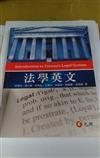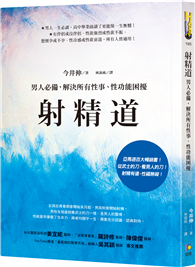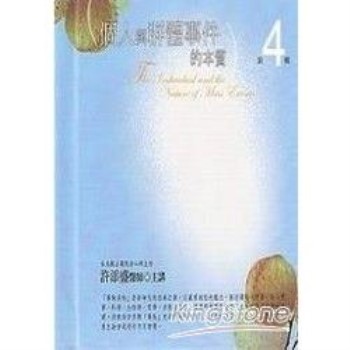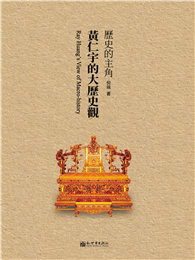本書的作者們均為國立臺北大學法律學院的老師,皆有留學美國的背景,各自在不同的專業領域深耕、研究及教學。由於作者們都有講授「法學英文」一科的經驗,深感「法學英文」在台灣法學教育的定位,除了英美法律觀念的認識外,如何以英文理解並表達本國的法律概念,也同等重要,因此萌生了共同撰寫一本以英文介紹我國法律制度書籍的想法。這一本書介紹了我國的法律架構、基本的法律規範與其實踐,內容涵蓋了緒論、憲法、民法及侵權行為法、契約法、刑事法、證券交易法及國際法。每一個章節都有導讀、本文及專有名詞選輯,隨後並附有選擇題及答案,幫助讀者檢視閱讀後的學習效果。
相信這一本書,不僅可以幫助本國讀者提升法學英文的能力,對於有心熟悉我國法制的外國法律人,也會是一個瞭解台灣法律的最佳管道。
| FindBook |
有 3 項符合
法學英文的圖書 |
| 圖書選購 |
| 型式 | 價格 | 供應商 | 所屬目錄 | 二手書 |
$ 160 |
二手中文書 |
$ 266 |
語言 |
$ 266 |
語言學習 |
|---|
| 圖書館借閱 |
| 國家圖書館 | 全國圖書書目資訊網 | 國立公共資訊圖書館 | 電子書服務平台 | MetaCat 跨館整合查詢 |
| 臺北市立圖書館 | 新北市立圖書館 | 基隆市公共圖書館 | 桃園市立圖書館 | 新竹縣公共圖書館 |
| 苗栗縣立圖書館 | 臺中市立圖書館 | 彰化縣公共圖書館 | 南投縣文化局 | 雲林縣公共圖書館 |
| 嘉義縣圖書館 | 臺南市立圖書館 | 高雄市立圖書館 | 屏東縣公共圖書館 | 宜蘭縣公共圖書館 |
| 花蓮縣文化局 | 臺東縣文化處 |
|
|
圖書介紹 - 資料來源:博客來 評分:
圖書名稱:法學英文
內容簡介
作者介紹
作者簡介
徐慧怡
現職
國立台北大學法律學系教授
學歷
美國聖塔克拉拉大學法學博士(J.D.)
經歷
曾任美國加州律師、台北大學法律學系主任、院長
張心悌
現職
國立台北大學法律學系教授
學歷
美國加州大學柏克萊分校法學博士(J.S.D.)
經歷
曾任律師、助理教授、副教授
蔡瑄庭
現職
國立臺北大學法律學系副教授
學歷
美國威斯康辛大學麥迪遜分校法學博士 (S.J.D.)
王震宇
現職
國立台北大學法律學系副教授
學歷
美國美利堅大學法學博士(S.J.D.)
李榮耕
現職
國立臺北大學法律學系副教授
學歷
美國印地安納大學布魯明頓校區莫勒法學院法學博士(S.J.D.)
官曉薇
現職
國立台北大學法律學系助理教授
學歷
美國賓州大學法學博士(S.J.D.)
黃銘輝
現職
國立臺北大學法律學系助理教授
學歷
美國威斯康辛大學麥迪遜分校法學博士 (S.J.D.)
徐慧怡
現職
國立台北大學法律學系教授
學歷
美國聖塔克拉拉大學法學博士(J.D.)
經歷
曾任美國加州律師、台北大學法律學系主任、院長
張心悌
現職
國立台北大學法律學系教授
學歷
美國加州大學柏克萊分校法學博士(J.S.D.)
經歷
曾任律師、助理教授、副教授
蔡瑄庭
現職
國立臺北大學法律學系副教授
學歷
美國威斯康辛大學麥迪遜分校法學博士 (S.J.D.)
王震宇
現職
國立台北大學法律學系副教授
學歷
美國美利堅大學法學博士(S.J.D.)
李榮耕
現職
國立臺北大學法律學系副教授
學歷
美國印地安納大學布魯明頓校區莫勒法學院法學博士(S.J.D.)
官曉薇
現職
國立台北大學法律學系助理教授
學歷
美國賓州大學法學博士(S.J.D.)
黃銘輝
現職
國立臺北大學法律學系助理教授
學歷
美國威斯康辛大學麥迪遜分校法學博士 (S.J.D.)
目錄
序 言
Preface
CHAPTER 1 INTRODUCTION
‧Cover Story/1
‧Learning Objectives in this Chapter/2
ⅠThe Origin of Law/3
ⅡThe Legal System/6
ⅢLegal Ethics/9
ⅣLegal Education/17
‧Word Bank/19
‧Practice Questions/20
‧Further Readings and Recommend Websites/25
CHAPTER 2 CONSTITUTIONAL LAW
‧Cover Story/27
‧Learning Objectives in this Chapter/29
ⅠHistorical Overview/30
ⅡConstitutionalism and Judicial Review/32
ⅢBasic Rights and Duties/39
ⅣSeparation of Powers/51
ⅤFundamental National Policies/64
‧Word Bank/66
‧Practice Questions/68
‧Further Readings and Recommend Websites/73
CHAPTER 3 CIVIL CODE AND TORTS
‧Cover Story/75
‧Learning Objectives in this Chapter/76
ⅠThe Introduction of the Civil Code/77
ⅡTort/84
ⅢThe Effect of Tort/94
‧Word Bank/96
‧Practice Questions/97
‧Further Readings/102
CHAPTER 4 CONTRACT LAW
‧Cover Story/103
‧Learning Objectives in this Chapter/108
ⅠFormation of a Contract/109
ⅡPerformance of the Contractual Duties/113
ⅢSelected Types of Contracts/118
ⅣDefinitions of Important Terms/120
‧Word Bank/126
‧Practice Questions/127
‧Further Readings and Recommend Websites/135
CHAPTER 5 CRIMINAL LAW AND CRIMINAL PROCEDURE
‧Cover Story/137
‧Learning Objectives in this Chapter/138
ⅠCriminal Law/139
ⅡCriminal Procedure/151
‧Word Bank/167
‧Practice Questions/168
‧Further Readings and Recommend Websites/176
CHAPTER 6 SECURITIES REGULATION
‧Cover Story/177
‧Learning Objectives in this Chapter/178
ⅠThe Framework of Securities Regulations/179
ⅡThe Definition of a Security/180
ⅢWhat is a public offering and private placement?/182
ⅣCorporate Governance of a Publicly-Held Company/184
ⅤThe Major Civil and Criminal Liabilities under the SEA/186
ⅥThe Mechanism of Tender Offer/198
‧Word Bank/200
‧Practice Questions/202
‧Further Readings and Recommend Websites/207
CHAPTER 7 INTERNATIONAL LAW AND PRACTICE OF R.O.C.
‧Cover Story/209
‧Learning Objectives in this Chapter/211
ⅠInternational Law as Law/212
ⅡThe Source of International Law/213
ⅢThe Relationship Between Municipal Law and International Law /216
ⅣJurisdiction Under International Law/221
ⅤSelected Issues of International Law: Trade and Human Rights/227
‧Word Bank/234
‧Treaties and International Conventions Bank/236
‧Practice Questions/238
‧Further Readings and Recommend Websites/241
Preface
CHAPTER 1 INTRODUCTION
‧Cover Story/1
‧Learning Objectives in this Chapter/2
ⅠThe Origin of Law/3
ⅡThe Legal System/6
ⅢLegal Ethics/9
ⅣLegal Education/17
‧Word Bank/19
‧Practice Questions/20
‧Further Readings and Recommend Websites/25
CHAPTER 2 CONSTITUTIONAL LAW
‧Cover Story/27
‧Learning Objectives in this Chapter/29
ⅠHistorical Overview/30
ⅡConstitutionalism and Judicial Review/32
ⅢBasic Rights and Duties/39
ⅣSeparation of Powers/51
ⅤFundamental National Policies/64
‧Word Bank/66
‧Practice Questions/68
‧Further Readings and Recommend Websites/73
CHAPTER 3 CIVIL CODE AND TORTS
‧Cover Story/75
‧Learning Objectives in this Chapter/76
ⅠThe Introduction of the Civil Code/77
ⅡTort/84
ⅢThe Effect of Tort/94
‧Word Bank/96
‧Practice Questions/97
‧Further Readings/102
CHAPTER 4 CONTRACT LAW
‧Cover Story/103
‧Learning Objectives in this Chapter/108
ⅠFormation of a Contract/109
ⅡPerformance of the Contractual Duties/113
ⅢSelected Types of Contracts/118
ⅣDefinitions of Important Terms/120
‧Word Bank/126
‧Practice Questions/127
‧Further Readings and Recommend Websites/135
CHAPTER 5 CRIMINAL LAW AND CRIMINAL PROCEDURE
‧Cover Story/137
‧Learning Objectives in this Chapter/138
ⅠCriminal Law/139
ⅡCriminal Procedure/151
‧Word Bank/167
‧Practice Questions/168
‧Further Readings and Recommend Websites/176
CHAPTER 6 SECURITIES REGULATION
‧Cover Story/177
‧Learning Objectives in this Chapter/178
ⅠThe Framework of Securities Regulations/179
ⅡThe Definition of a Security/180
ⅢWhat is a public offering and private placement?/182
ⅣCorporate Governance of a Publicly-Held Company/184
ⅤThe Major Civil and Criminal Liabilities under the SEA/186
ⅥThe Mechanism of Tender Offer/198
‧Word Bank/200
‧Practice Questions/202
‧Further Readings and Recommend Websites/207
CHAPTER 7 INTERNATIONAL LAW AND PRACTICE OF R.O.C.
‧Cover Story/209
‧Learning Objectives in this Chapter/211
ⅠInternational Law as Law/212
ⅡThe Source of International Law/213
ⅢThe Relationship Between Municipal Law and International Law /216
ⅣJurisdiction Under International Law/221
ⅤSelected Issues of International Law: Trade and Human Rights/227
‧Word Bank/234
‧Treaties and International Conventions Bank/236
‧Practice Questions/238
‧Further Readings and Recommend Websites/241
序
科技的發展與進步,讓世界越來越靠近,各國接觸頻繁的結果,跨國案例也越來越多,對於他國法律的瞭解,成為現代法律人不可避免的課題;同時,如何介紹本國法律讓外國認識,更是法律人學習中的重要一環。在英文仍是世界共同語言的現在,專業的法學英文自然成為跨國法律爭議中的共同語言,如何學習法學英文,更是成為達到成功法律人的基礎墊腳石。
為了讓法律人能夠熟悉英美的法律制度,各大學的法律學院或法律學系早就開始教授英美法導論、英美契約法、英美侵權法等等課程,但是對於如何使用英文表達我國的法律,則是最近數年才開始普遍發展的教學內容。2011年,台灣的律師與司法官考試新增法學英文一科,依照考選部命題大綱所公布的原則,其核心能力為「獲取法律專業知識的基本法學英文閱讀能力」,包含新聞報導與法院判決常用之字彙、片語及文法句型,並使學生理解新聞報導與法院判決的主旨與要意。換言之,就是希望通過律師與司法官考試的未來律師或司法官,都能閱讀新聞中有關法律案件的報導,或者能夠瞭解外國判例或判決的主旨與要意。本書的內容除針對法學英文的命題大綱內容——緒論、憲法、民事法中之契約與侵權、證券交易法與刑事法等領域加以介紹外,外並進一步針對我國國際法與其實踐提出重點說明。本書的撰寫方式全部以英文為主,每章均以cover story的方式導讀,讓閱讀者可以瞭解本章所要陳述的內容,結束時並輔以問題,讓學習者有自我檢視是否瞭解本文內容的機會。本書希望能提供學生準備律師、司法官考試使用,並成為從事法律實務工作者的參考入門,同時也期待提供不懂中文的外國法律人,一個可以瞭解台灣法律的最佳管道。
本書的出版,要特別感謝所有撰寫的國立台北大學法律學院的教授們,雖然他們在法律各領域均學有專精,也都曾留學美國,是以對於相關領域的英美法律用語,有深入的研究,但因為他們平日教學研究非常繁忙,若沒有對於法學教育的熱忱,無法完成此書。最後,期待這本書的出版,能協助台灣的法律更加接近國際化。
Preface
Taiwan is a Chinese speaking country that is governed by civil law. Thus, Taiwan’s statutory regulations, complaints and judgments, as well as a majority of its law school textbooks and supplements, are all written in Chinese. In fact, the Court Organization Act and the Attorney Regulation Act, both expressly provide that the judge is required to use the Chinese while conducting proceedings in court, and all documents submitted by attorneys in the course of their professional work must be drafted in Chinese characters as approved. Moreover, a non-citizen licensed to practice law within the R.O.C.’s territory is required to use the Chinese either in court proceedings or at an investigation procedure.
Due to the substantial increase in transnational cases, English has become the standard language for transnational litigations. In order to familiarize law students and members of the legal profession with English legal terms of art, law schools in Taiwan have long ago introduced courses of Anglo American Law. Scholars did not until recently, however, attempt to interpret Taiwan’s law in English through various teaching methods.
As of 2011, Taiwan’s Bar and Judicial Exams have incorporated an additional subject—Legal English. In accordance with the standards established by the Ministry of Examinations, the Legal English subject evaluates the examinees’ ability to read English newspaper articles related to law, court decisions, and commonly used legalese. Besides evaluating the examinees’ English comprehension, the purpose of incorporating this extra subject into the Exams is also to promote the ability of future lawyers and judges to read and interpret foreign court decisions.
This book address provides an in depth analysis of the following topics: Torts, Contracts, Securities Regulations, Criminal Law and Procedures, and Constitutions. The book also highlights other aspects of laws in Taiwan, such as the legal systems, and International Aspects of R.O.C. Law. Our vision is to provide legal education and basic legal terms in English to prospective lawyers, judges, those currently practicing in the profession, as well as give foreigners a general understanding of the laws of Taiwan. Additionally, the book will begin each chapter with a cover story to provide readers with a general idea of the topic covered in the chapter. At the end of the chapter, the book will give readers an opportunity to examine their understanding of the material through a self-quiz.
The writers of this book are faculty members of the College of Law, National Taipei University, all of whom studied law both in Taiwan and the United States. They all teach courses in their areas of expertise and have all conducted extensive research on Anglo-American legal terminology. Additionally, in order to bolster the accuracy of this book, we thank Tiffany Wang and Jessica Chu, two extremely talented young ladies receiving their legal education in California, for helping the editing work of this book.
為了讓法律人能夠熟悉英美的法律制度,各大學的法律學院或法律學系早就開始教授英美法導論、英美契約法、英美侵權法等等課程,但是對於如何使用英文表達我國的法律,則是最近數年才開始普遍發展的教學內容。2011年,台灣的律師與司法官考試新增法學英文一科,依照考選部命題大綱所公布的原則,其核心能力為「獲取法律專業知識的基本法學英文閱讀能力」,包含新聞報導與法院判決常用之字彙、片語及文法句型,並使學生理解新聞報導與法院判決的主旨與要意。換言之,就是希望通過律師與司法官考試的未來律師或司法官,都能閱讀新聞中有關法律案件的報導,或者能夠瞭解外國判例或判決的主旨與要意。本書的內容除針對法學英文的命題大綱內容——緒論、憲法、民事法中之契約與侵權、證券交易法與刑事法等領域加以介紹外,外並進一步針對我國國際法與其實踐提出重點說明。本書的撰寫方式全部以英文為主,每章均以cover story的方式導讀,讓閱讀者可以瞭解本章所要陳述的內容,結束時並輔以問題,讓學習者有自我檢視是否瞭解本文內容的機會。本書希望能提供學生準備律師、司法官考試使用,並成為從事法律實務工作者的參考入門,同時也期待提供不懂中文的外國法律人,一個可以瞭解台灣法律的最佳管道。
本書的出版,要特別感謝所有撰寫的國立台北大學法律學院的教授們,雖然他們在法律各領域均學有專精,也都曾留學美國,是以對於相關領域的英美法律用語,有深入的研究,但因為他們平日教學研究非常繁忙,若沒有對於法學教育的熱忱,無法完成此書。最後,期待這本書的出版,能協助台灣的法律更加接近國際化。
徐慧怡及作者一同
Preface
Taiwan is a Chinese speaking country that is governed by civil law. Thus, Taiwan’s statutory regulations, complaints and judgments, as well as a majority of its law school textbooks and supplements, are all written in Chinese. In fact, the Court Organization Act and the Attorney Regulation Act, both expressly provide that the judge is required to use the Chinese while conducting proceedings in court, and all documents submitted by attorneys in the course of their professional work must be drafted in Chinese characters as approved. Moreover, a non-citizen licensed to practice law within the R.O.C.’s territory is required to use the Chinese either in court proceedings or at an investigation procedure.
Due to the substantial increase in transnational cases, English has become the standard language for transnational litigations. In order to familiarize law students and members of the legal profession with English legal terms of art, law schools in Taiwan have long ago introduced courses of Anglo American Law. Scholars did not until recently, however, attempt to interpret Taiwan’s law in English through various teaching methods.
As of 2011, Taiwan’s Bar and Judicial Exams have incorporated an additional subject—Legal English. In accordance with the standards established by the Ministry of Examinations, the Legal English subject evaluates the examinees’ ability to read English newspaper articles related to law, court decisions, and commonly used legalese. Besides evaluating the examinees’ English comprehension, the purpose of incorporating this extra subject into the Exams is also to promote the ability of future lawyers and judges to read and interpret foreign court decisions.
This book address provides an in depth analysis of the following topics: Torts, Contracts, Securities Regulations, Criminal Law and Procedures, and Constitutions. The book also highlights other aspects of laws in Taiwan, such as the legal systems, and International Aspects of R.O.C. Law. Our vision is to provide legal education and basic legal terms in English to prospective lawyers, judges, those currently practicing in the profession, as well as give foreigners a general understanding of the laws of Taiwan. Additionally, the book will begin each chapter with a cover story to provide readers with a general idea of the topic covered in the chapter. At the end of the chapter, the book will give readers an opportunity to examine their understanding of the material through a self-quiz.
The writers of this book are faculty members of the College of Law, National Taipei University, all of whom studied law both in Taiwan and the United States. They all teach courses in their areas of expertise and have all conducted extensive research on Anglo-American legal terminology. Additionally, in order to bolster the accuracy of this book, we thank Tiffany Wang and Jessica Chu, two extremely talented young ladies receiving their legal education in California, for helping the editing work of this book.
Huei-Yi Shyu and authors
法學英文 相關搜尋
新多益黃金互動16週:基礎篇 (增訂二版) (附電子朗讀音檔、解析夾冊、模擬試題)看故事學越南語:令人驚豔的越南瑤族民間古籍故事
英語力:16堂流利英語聽說入門訓練課【Starter】(菊8K+寂天雲隨身聽APP)
英語力 1:16堂流利英語聽說訓練課 (菊8K+別冊+寂天雲隨身聽APP)
英語力 2:16堂流利英語聽說訓練課(菊8K+別冊+寂天雲隨身聽APP)
我的第一本越南語文法:超詳細文法解講+練習,越南語文法一看就懂,自學教學都適用(附QR碼線上音檔)
GEPT全民英檢初級閱讀測驗初試1次過:每日刷題10分鐘,1天2頁,1個月後高分過關!
征服考場英文閱讀得分王:用「抓補法」速效解題技巧,戰勝克漏字及閱讀測驗!
FUN學美國各學科Preschool閱讀課本03:名詞篇
我的第一堂法語課
|












